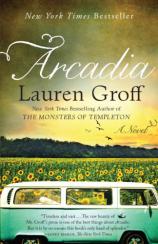Arcadia
Review
Arcadia
Lauren Groff is a writer with a strong --- if sometimes quirky --- sense of history. Her debut novel, THE MONSTERS OF TEMPLETON, examined the history of Cooperstown, New York, through the experience of one young woman looking for her own past. Her story collection, DELICATE EDIBLE BIRDS, ranged widely over American and world history, from the 1918 influenza epidemic to the 1970s women's movement to the Nazi invasions in World War II. Now, in ARCADIA, Groff takes lessons from a particular moment in recent history and applies them to our present and future.
"ARCADIA is far more than a portrait of a 'fringe' community or a saga of corruption and lost innocence. It's an extended conversation --- one in which the reader is an active participant --- on the fragility of nature, the power and necessity of connection, and the dual human compulsion to preserve and destroy both."
That moment in history is the 1970s of communal living, of idealistic Utopian communities. The place is one commune in particular, the Arcadia of the novel's title. When we first meet Ridley Stone (known to all as "Bit" for his small stature), he is five years old, the son of Hannah and Abe, two of the original residents of this tight-knit community. Bit knows that his mother is often nearly paralyzed with sadness, but that, like the seasons, she always comes back to him: "He sees it clearly, now, how time is flexible, a rubber band. It can stretch long and be clumped tight, can be knotted and folded over itself, and all the while it is endless, a loop…. The year will end, another one will begin, will end…. Summer Hannah will take over from Winter Hannah with a slowly crisping voice and a new pair of dungarees."
Bit is aware that his father has a complicated relationship with Handy, the commune's charismatic leader. But mostly, he recognizes that he is surrounded by adults who look out for each other and care for him, that he is in a place of beauty and safety, even if it's getting crowded and there's never enough food or quite enough heat. He knows he is loved.
The above quote is particularly relevant to the structure of Groff's novel as a whole, which also seems to treat time as a rubber band to stretch out and clump up at will, a technique that may frustrate some readers but will delight others who enjoy both lingering in the moments Groff chooses to dwell on and filling in the gaps in time she leaves between them. The first gap jumps from Bit's young childhood to his teenage years, as Arcadia seems to have also outgrown its innocent origins. We leave a terrified Bit as he leaves Arcadia with his parents: "They go around a bend he has never been around, a house he has never seen; all is doubly new, sick with newness."
Groff then, probably wisely, skips forward again, twice --- once to show Bit as a new father himself, living in New York City in a continual attempt to find the sense of community, of closeness, he knew in Arcadia as a child. And, finally, we skip ahead to the near future, when a variety of circumstances lead Bit to return to Arcadia, wondering what remains of the place --- and the people, including himself --- he once knew.
Groff does ask her readers to make a lot of leaps in this novel, but she more than rewards those willing to make this trip with her. ARCADIA is far more than a portrait of a "fringe" community or a saga of corruption and lost innocence. It's an extended conversation --- one in which the reader is an active participant --- on the fragility of nature, the power and necessity of connection, and the dual human compulsion to preserve and destroy both.
Reviewed by Norah Piehl on March 15, 2012
Arcadia
- Publication Date: October 2, 2012
- Genres: Fiction
- Paperback: 304 pages
- Publisher: Hyperion
- ISBN-10: 140134190X
- ISBN-13: 9781401341909





